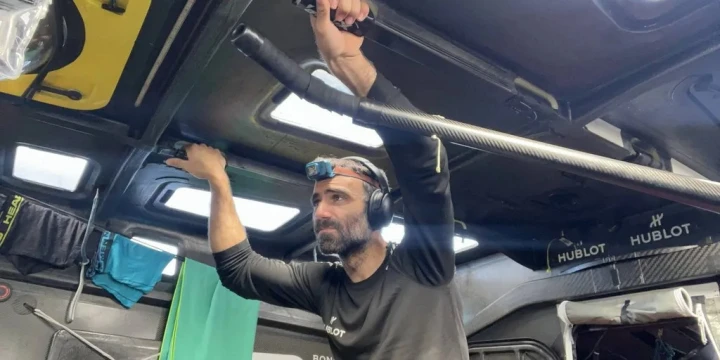
28 NOVEMBRE 2024 : Photo envoyée depuis le bateau Hublot lors de la course à la voile du Vendée Globe le 28 novembre 2024. (Photo du skipper Alan Roura)
Vendée Globe: nerves build as transition time arrives
Still led by Charlie Dalin (MACIF Santé Prévoyance) the top skippers on the Vendée Globe have now completed around a quarter of the solo round the world course. While they had a slow passage to the Equator, Dalin and co now seem to be on course to break Alex Thomson’s 8 days and 15 hours record from Equator to the Cape of Good Hope which he set on the 2016 edition of the race. Present routing predictions have the top skippers passing in the middle of the day tomorrow, so around a day quicker for this sector of the route.
As the pace is set to finally ease down slightly Dalin has seen his cushion shrink progressively. This Wednesday afternoon the top four skippers are all now within 40 miles of him as they contemplate one of the most potentially challenging and difficult phases of the race, the Cape of Good Hope and the Agulhas currents.
“The Cape of Good Hope is the most difficult place due to the strong winds and adverse currents and so the skippers are right to be worried.” warned Ocean Race and Arkéa Ultim Challenge race winner Charles Caudrelier today on the Vendée live show. “The forces on the boats and the skippers from the last few days and the intensity of close proximity of the competitors is a huge risk as they all know it can all stop at anytime.”
Next moves
Right now they are contemplating their next move and prepping as best they can for the big south and setting up for their first gybe, their first major manoeuvre, after nearly a dozen days and nights straight lining on port gybe.
"Since this morning, the sea has calmed down and the wind has dropped a little. The conditions are a little more bearable than the last four or five days. Always hanging on is not fun all the time. A little respite is not unpleasant!" commented Nicolas Lunven (Holcim – PRB), "We have been making progress on port tack since the west of the Canaries, that is to say almost twelve days. My right leg is starting to feel a little bigger than my left leg! It will be good for this to end and for us to move on to the next phase a little.”
In the coming hours the leaders will negotiate a transition phase between their depression and the Austral low pressure train which are circulating eastwards on the edge the Arctic Exclusion Zone (EZA). Lunven and the leaders will have to first deal with significantly weaker winds from tomorrow and for a period of around 48 hours, before heading more sharply towards the South and then taking the slip road on to the east going autobahn.
"Having a little less stressful conditions for two days will allow us to rest, eat well, make a good tour of the boat and repair the few little bits and pieces that are needing done", added Lunven.
We have been making progress on port tack since the west of the Canaries, that is to say almost twelve days. My right leg is starting to feel a little bigger than my left leg! It will be good for this to end and for us to move on to the next phase a little.
NicolasLunvenHOLCIM - PRB
Dealing with the job list and prepping for the south.
Recovering from a tough period when she terminally damaged here J0 headsail Switzerland’s Justine Mettraux (TeamWork - Groupe Snef) is also setting up for the south. “I tried to recover a bit last night I felt like I needed it and my food intake has been OK. I feel in a good place this morning and now it is time to focus on the race and strategy a bit more. Now we are getting towards the Southern Ocean the J0 is not a sail we use that much, so I can use the smaller sail and not be so impacted by the loss of my J0.”
Mettraux continued, “It is still quite warm in the boat but the sea temperature is getting colder, so it makes everything a bit cooler and you don’t want to have your feet in the water for example.
The boat is in pretty good condition there are a few things I can work on tomorrow in the light conditions all day, I will try to make the most of tomorrow to make the boat ready for what’s next.”
The skipper of TeamWork Team Snef, like Sam Davies (Initiatives-Cœur), Boris Herrmann (Malizia - Seaexplorer) or Clarisse Crémer (L'Occitane en Provence), has already started to make the small adjustment gybes needed to move between the front to her North and then the Saint Helena high to her south, all of them looking to stay with the best breeze, easier said than done, given that on one side, to the south it is very light and on the other, the wind is very unstable.
Same progamme
And it is the same programme for those behind, back to Damien Seguin (Groupe APICIL). He too will have to wait until the middle of the weekend to hook into the next, new depression. But this new low will at least to the middle of the Indian Ocean and it should allow them to stem the loss of miles to the leaders.
What about the bulk of the peloton led by Arnaud Boissières (La Mie Câline)? For the time being, he continues to lead a single file or almost towards the southern tip of the African continent. He, as leader of this next group might cross the Cape of Good Hope in the evening and on Wednesday, so some five days after the leaders who should cross the longitude of the famous tip of South African from tomorrow at midday.
From this evening, the leading trio composed of Charlie Dalin (MACIF Santé Prévoyance), Sébastien Simon (Groupe Dubreuil) and Thomas Ruyant (VULNERABLE) should already be feeling the effects of the Agulhas Current, one of the strongest and most regular surface currents on the planet. "This is a point of vigilance for us because it can reach 3-4 knots and even more in certain places. The real problem is that from the Cape of Good Hope, it starts to swirl a bit. It is therefore quite difficult to plot.
"It is difficult to have a good understanding of it," explained Lunven, who is furiously studying it all very closely, for good reason as the current opposes the wind and builds sometimes brutal boat breaking waves, even the odd rogue waves up to 30 metres high.
The boat is in pretty good condition there are a few things I can work on tomorrow in the light conditions all day, I will try to make the most of tomorrow to make the boat ready for what’s next
JustineMettrauxTeamwork-Team Snef





